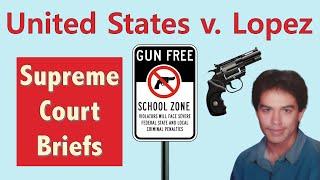United States v. Lopez: Redefining Federalism and Commerce Clause Limits
Historical Context and Constitutional Significance of United States v. Lopez
In 1995, the Supreme Court delivered a transformative verdict in United States v. Lopez, a case that fundamentally altered the interpretation of the Commerce Clause within the U.S. Constitution. Alfonso Lopez Jr., a high school student in San Antonio, Texas, was federally prosecuted for carrying a concealed firearm on school grounds under the Gun-Free School Zones Act of 1990. The central legal issue revolved around whether Congress had the constitutional authority to regulate gun possession in local school zones under its power to regulate interstate commerce. The Court’s narrow 5-4 decision curtailed federal legislative reach, reaffirming the constitutional limits on Congress and emphasizing the preservation of state sovereignty in matters traditionally managed at the local level.
- Commerce Clause Overview: Empowers Congress to regulate trade and commercial activities crossing state boundaries.
- Federal Authority Constraints: The ruling restricted Congress’s ability to legislate on non-economic, local activities.
- State vs. Federal Jurisdiction: Strengthened the role of states in governing local safety and criminal laws.
| Category | Details |
|---|---|
| Year of Decision | 1995 |
| Outcome | 5-4 ruling favoring Lopez |
| Constitutional Focus | Commerce Clause |
| Legal Impact | Constrained federal regulatory power |
Supreme Court’s Decision and Its Repercussions on Federal Authority
The Supreme Court’s judgment in United States v. Lopez signaled a judicial shift toward limiting Congress’s expansive interpretation of the Commerce Clause. By invalidating the Gun-Free School Zones Act, the Court underscored that federal regulation must be directly tied to economic activity affecting interstate commerce. This ruling curtailed the federal government’s ability to intervene in areas traditionally governed by states, such as local crime prevention and education policy. It also revitalized the judiciary’s role in scrutinizing congressional overreach, marking a renewed commitment to maintaining the constitutional balance between state and federal powers.
Key outcomes of this decision include:
- Reinforcement of State Sovereignty: Affirmed states’ primary role in regulating local matters without excessive federal interference.
- Restriction on Congressional Reach: Required a clear economic connection for federal laws under the Commerce Clause.
- Enhanced Judicial Oversight: Courts became more vigilant in evaluating the constitutionality of federal statutes.
| Aspect | Before Lopez | After Lopez |
|---|---|---|
| Scope of Federal Commerce Power | Extensive and broadly interpreted | More narrowly defined, requiring economic nexus |
| State Authority | Often subordinate to federal law | Strengthened and more autonomous |
| Judicial Role | Generally deferential to Congress | More assertive in constitutional review |
Impact on Gun Control Policies and Legislative Practices
The ruling in United States v. Lopez significantly influenced the federal government’s capacity to regulate firearms near educational institutions. It marked the first major judicial limitation on the Commerce Clause in over 50 years, signaling that not all gun-related issues fall under federal jurisdiction. Consequently, this decision empowered states to develop tailored firearm regulations that reflect their unique community needs, resulting in a diverse array of gun laws nationwide.
Notable effects on gun control legislation include:
- Increased State Authority: States now have greater discretion to enact localized gun policies, leading to varied regulatory landscapes.
- More Targeted Federal Laws: Congress has since crafted firearm regulations with explicit links to interstate commerce to withstand judicial challenges.
- Legal Precedent: The Lopez case is frequently cited in subsequent rulings, shaping the boundaries of federal involvement in gun control.
| Aspect | Pre-Lopez | Post-Lopez |
|---|---|---|
| Federal Jurisdiction | Broad authority under Commerce Clause | Limited, requiring clear commerce connection |
| State Regulation | Restricted in school zone firearm laws | Expanded ability to regulate locally |
| Legislative Drafting | Broad federal statutes with minimal commerce basis | More precise laws tied to commerce activity |
Strategic Policy Approaches for Balancing Federalism Post-Lopez
In light of the complexities underscored by United States v. Lopez, policymakers must strive for clear demarcations between federal and state powers. Establishing well-defined legislative boundaries is essential, especially in domains traditionally managed by states such as education, public safety, and local crime control. Granting states enhanced autonomy encourages innovative, community-specific solutions while reserving federal intervention for issues with genuine national significance.
To foster cooperative federalism and minimize jurisdictional conflicts, the following strategies are recommended:
- Interstate Agreements: Formal compacts among states to harmonize policies on firearms, drug enforcement, and other cross-border concerns.
- Conditional Federal Funding: Grant programs designed with clear, adaptable criteria that respect state sovereignty and encourage compliance.
- Regular Legislative Reviews: Periodic assessments of federal statutes to ensure alignment with constitutional commerce and criminal jurisdiction limits.
| Policy Area | Recommended Strategy |
|---|---|
| State Empowerment | Explicitly grant legislative authority to states |
| Federal Oversight | Restrict to matters of national scope |
| Intergovernmental Collaboration | Promote formal agreements and joint policymaking |
Conclusion: The Enduring Legacy of United States v. Lopez
The United States v. Lopez decision remains a cornerstone in American constitutional jurisprudence, marking the first major judicial limitation on Congress’s Commerce Clause authority in decades. This landmark ruling continues to shape the ongoing dialogue about the division of power between federal and state governments. Its influence extends beyond legal theory, affecting legislative drafting, judicial review, and policy formulation. As debates over federalism evolve, Lopez stands as a critical reference point for understanding and navigating the constitutional boundaries of federal jurisdiction.




